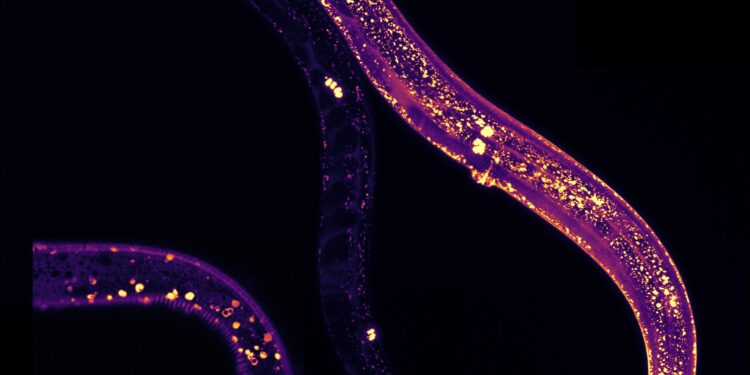C. elegans examined under a microscope. The yellow and purple dots are the regions where the MANF protein is found. Credit: McMaster University
Researchers at McMaster University have discovered a previously unknown cellular protective function of a protein, which could open new avenues for treating age-related diseases and lead to healthier aging in general.
The team discovered that a class of protective proteins called MANF plays a role in the process that keeps cells efficient and functioning properly.
The results appear in the journal Proceedings of the National Academy of Sciences.
Our cells make proteins and release them after they have done their job. This efficient and ongoing maintenance process is known as cellular homeostasis. However, as we age, our cells’ ability to keep up decreases.
Cells can create proteins incorrectly and the cleaning process can become faulty or overwhelmed. As a result, proteins can clump together, leading to harmful buildup associated with diseases such as Alzheimer’s and Parkinson’s.
“If cells experience stress because this protein aggregation has started, the endoplasmic reticulum, where proteins are made and then released, receives the signal to stop making these proteins,” explains biology professor Bhagwati Gupta, who supervised the research.
“If the problem is not addressed, the cell will die, which ultimately leads to neuron degeneration and then the neurodegenerative diseases we see.”
Previous studies, including McMaster’s, have shown that MANF protects against increased cellular stress. The team sought to understand how this happens by studying microscopic worms known as C. elegans. They created a system to manipulate the amount of MANF in C. elegans.
“We could literally see where MANF was expressed in the worms because they are translucent. We could see it in all the different tissues. In these tissues, MANF was present in structures called lysosomes which are associated with the duration of life and protein aggregation,” Shane said. Taylor, now a postdoctoral researcher at the University of British Columbia, who worked on the project for his Ph.D. at McMaster.
The team discovered that MANF plays a key role in the cell elimination process by helping to break down accumulated proteins, thereby keeping cells healthier and clutter-free.
Increasing MANF levels also activates a natural cleaning system within cells, helping them function better for longer.
“Although our research focused on worms, the results reveal universal processes. MANF is present in all animals, including humans. We are learning fundamental and mechanistic details that could then be tested in higher systems” , Taylor said.
To develop MANF as a potential therapy, researchers want to understand which other players MANF interacts with.
“The discovery of MANF’s role in cellular homeostasis suggests that it could be used to develop treatments for diseases that affect the brain and other parts of the body by targeting cellular processes, removing these toxic clumps in the cells and maintaining their health,” Gupta said.
“The central idea of aging research is basically: can we make processes better and more efficient. By understanding how MANF works and targeting its function, we could develop new treatments for diseases related to age. We want to live longer and healthier types of players could contribute to this.
More information:
Shane KB Taylor et al, Neurotrophic factor MANF regulates autophagy and lysosome function to promote proteostasis in Caenorhabditis elegans, Proceedings of the National Academy of Sciences (2024). DOI: 10.1073/pnas.2403906121
Provided by McMaster University
Quote: Researchers discover new role for proteins in fighting age-related diseases (October 18, 2024) retrieved October 18, 2024 from
This document is subject to copyright. Apart from fair use for private study or research purposes, no part may be reproduced without written permission. The content is provided for informational purposes only.



